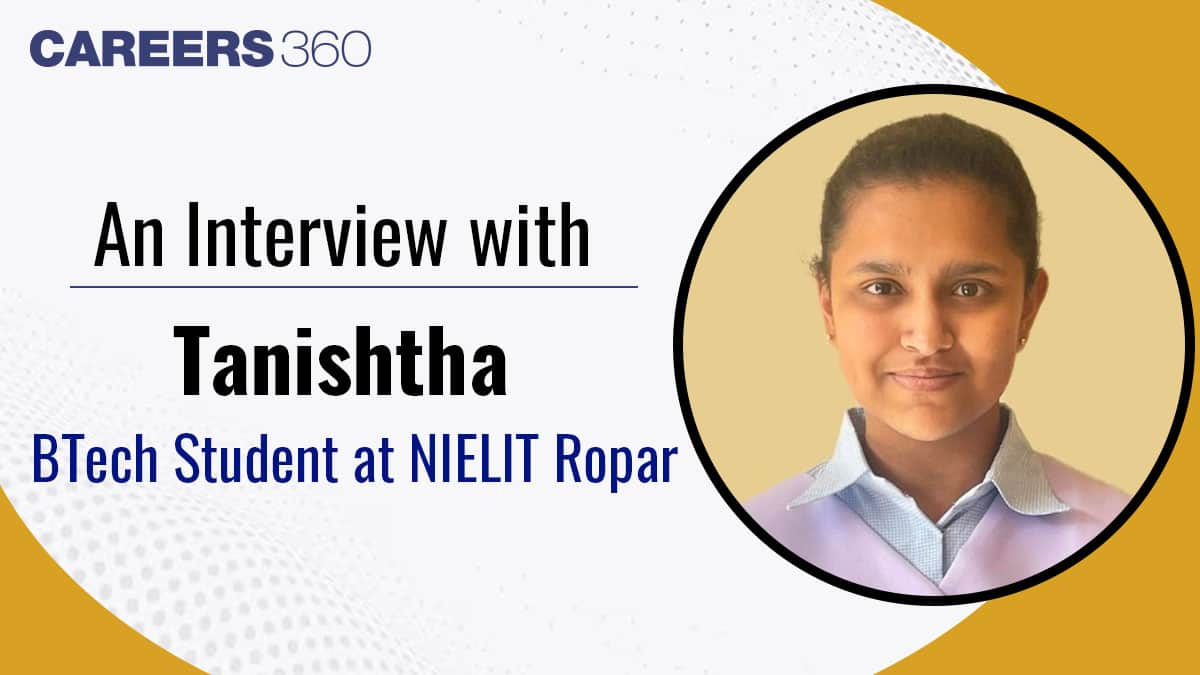An Interview with Tanishtha, a BTech Student at NIELIT Ropar
National Institute of Electronics and Information Technology was established in the year 1978. NIELIT admissions are offered based on the scores obtained in entrance exams such as JEE Main/ GATE. NIELIT courses are offered at the diploma, UG and PG levels. This interview with Tanishtha, a B.Tech student at NIELIT is brought to you by Careers360. In this interview, Tanishtha speaks about the campus life, clubs and administrative processes at NIELIT Ropar.

Careers360: Please give us an introduction of yourself.
Tanishtha: My name is Tanishtha, and I am currently pursuing my B.Tech in Computer Science and Engineering (AIML) from NIELIT. I am passionate about programming, new technologies, and exploring innovations in the tech world. I believe in continuous learning and self-improvement.
Careers360: How would you describe the overall campus environment of NIELIT?
Tanishtha: The overall campus environment at NIELIT is quite positive and motivating. The faculty is supportive, and the infrastructure supports academic growth. The atmosphere encourages students to collaborate, learn, and innovate.
Careers360: How student-friendly are the administrative processes at NIELIT?
Tanishtha: The administrative processes are generally student-friendly. Most processes like fee submission, document verification, and communication with faculty are smooth and organised. If there are any issues, they are usually resolved efficiently.
Careers360: Are there any unique aspects of NIELIT campus life that you think set it apart from other institutions?
Tanishtha: One unique aspect is the national-level network of NIELIT centres, which offers exposure to competitions, collaboration, and centralised certifications. The emphasis on industry-relevant skills and short-term courses adds value beyond the regular curriculum.
Careers360: Did you face any difficulty during the initial months of your joining the institute?
Tanishtha: Initially, adapting to the new environment was a bit challenging. However, with time and support from faculty and friends, I adjusted well.
Careers360: How would a typical day at the NIELIT campus look like for you?
Tanishtha: A typical day includes attending lectures and labs, working on assignments or projects, and spending time in the library or computer labs.
Careers360: Are there active student clubs (technical, cultural, or hobby-based) at your NIELIT campus?
Tanishtha: Yes, we have various student clubs such as coding clubs, cultural clubs, public speaking clubs and sports club. These provide a platform to explore interests outside academics.
Careers360: Does the NIELIT campus organise tech fests, seminars, or student events?
Tanishtha: Yes, NIELIT organises workshops and seminars. These events help students showcase their talents and learn from experts in the industry.
Careers360: Have you had opportunities to participate in inter-NIELIT or external events/competitions?
Tanishtha: Yes, we are encouraged to participate in various events such as hackathons, coding contests, and paper presentations. These events provide great exposure and learning.
Careers360: What would you like to improve about campus life at your NIELIT campus?
Tanishtha: Campus life at NIELIT can be improved by developing more student-friendly infrastructure, such as proper hangout spots and informal gathering areas. The campus would benefit from improved playgrounds or sports facilities to encourage physical activity and team bonding. Additionally, organising more frequent tech events, workshops, and industry interactions would make campus life more engaging and well-rounded.
Careers360: Are there enough hangout spots or common areas on campus? If yes, then which one is your favourite and why?
Tanishtha: Honestly, one area where NIELIT can improve is in providing dedicated hangout spots or common areas for students. While there are basic seating areas where students gather informally, there aren’t enough well-developed or relaxing spaces like student lounges or shaded outdoor hangouts. Having more such areas would definitely enhance the overall campus life experience.
Careers360: Share a memorable moment from your time spent at the NIELIT campus.
Tanishtha: One memorable moment was when we organised an event. It was an enriching experience that boosted my confidence and gave me a sense of accomplishment. I learnt how to manage the stage and fulfil responsibilities.
Careers360: What advice would you give to a new student joining NIELIT?
Tanishtha: My advice would be to stay curious, be proactive in learning, and make the most of the resources available. Join clubs, attend events, and don't hesitate to seek help from faculty or seniors when needed.
Disclaimer: This article has been published as a marketing initiative between Careers360 and NIELIT Ropar.
List of Related colleges
Applications for Admissions are open.
Among top 100 Universities Globally in the Times Higher Education (THE) Interdisciplinary Science Rankings 2026
Amrita University B.Tech 2026
ApplyRecognized as Institute of Eminence by Govt. of India | NAAC ‘A++’ Grade | Upto 75% Scholarships
Amity University-Noida M.Tech Admissions 2026
ApplyAmong top 100 Universities Globally in the Times Higher Education (THE) Interdisciplinary Science Rankings 2026
Vignan's Deemed to be University B.Tech Admissions 2026
Apply70th University Ranked by NIRF | 80th Engineering Rank by NIRF | Accredited by NBA and NAAC A+
UPES B.Tech Admissions 2026
ApplyLast Date to Apply: 26th March | Ranked #43 among Engineering colleges in India by NIRF | Highest Package 1.3 CR , 100% Placements
Victoria University, Delhi NCR
ApplyApply for UG & PG programs from Victoria University, Delhi NCR Campus
